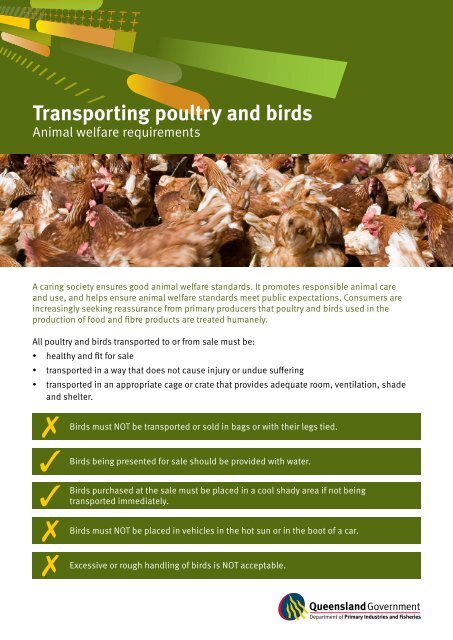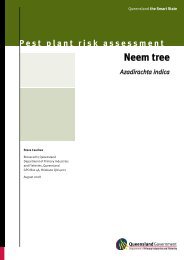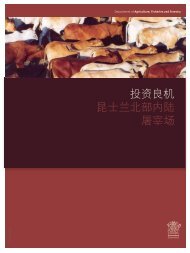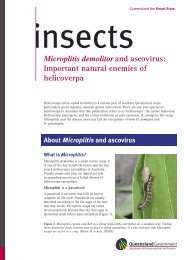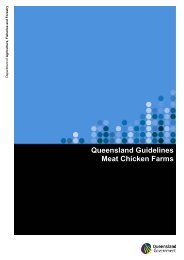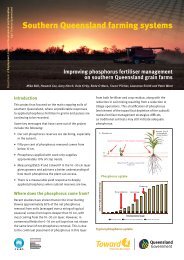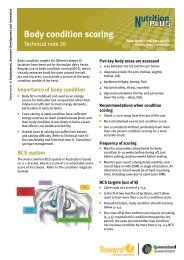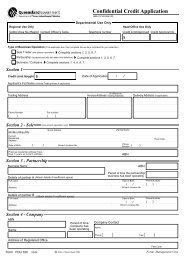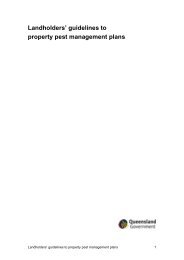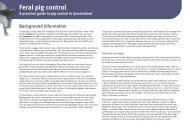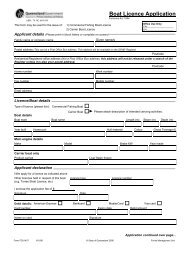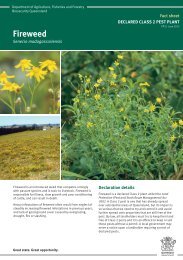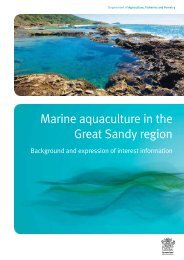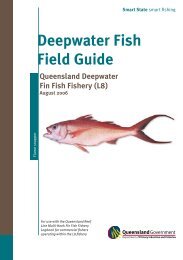Transporting poultry and birds - Department of Primary Industries
Transporting poultry and birds - Department of Primary Industries
Transporting poultry and birds - Department of Primary Industries
Create successful ePaper yourself
Turn your PDF publications into a flip-book with our unique Google optimized e-Paper software.
<strong>Transporting</strong> <strong>poultry</strong> <strong>and</strong> <strong>birds</strong><br />
Animal welfare requirements<br />
A caring society ensures good animal welfare st<strong>and</strong>ards. It promotes responsible animal care<br />
<strong>and</strong> use, <strong>and</strong> helps ensure animal welfare st<strong>and</strong>ards meet public expectations. Consumers are<br />
increasingly seeking reassurance from primary producers that <strong>poultry</strong> <strong>and</strong> <strong>birds</strong> used in the<br />
production <strong>of</strong> food <strong>and</strong> fibre products are treated humanely.<br />
All <strong>poultry</strong> <strong>and</strong> <strong>birds</strong> transported to or from sale must be:<br />
• healthy <strong>and</strong> fit for sale<br />
• transported in a way that does not cause injury or undue suffering<br />
• transported in an appropriate cage or crate that provides adequate room, ventilation, shade<br />
<strong>and</strong> shelter.<br />
Birds must NOT be transported or sold in bags or with their legs tied.<br />
Birds being presented for sale should be provided with water.<br />
Birds purchased at the sale must be placed in a cool shady area if not being<br />
transported immediately.<br />
Birds must NOT be placed in vehicles in the hot sun or in the boot <strong>of</strong> a car.<br />
Excessive or rough h<strong>and</strong>ling <strong>of</strong> <strong>birds</strong> is NOT acceptable.
Appropriate cages <strong>and</strong> crates<br />
Adequate room<br />
Cages must be <strong>of</strong> sufficient height to allow <strong>birds</strong> to sit comfortably during transport (turkeys are<br />
prone to injury if allowed to st<strong>and</strong> in crates).<br />
There should be sufficient space to allow all <strong>birds</strong> to rest on the floor at the same time <strong>and</strong> remain<br />
evenly distributed.<br />
Consider weather conditions when determining loading densities. Allow additional space on hot<br />
or humid days.<br />
Cages <strong>and</strong> crates should be designed to prevent injuries, <strong>and</strong> cage doors should be as large<br />
as practicable.<br />
Adequate ventilation<br />
All cages or crates should be well ventilated.<br />
Adequate shade<br />
All <strong>birds</strong> should be provided with adequate shade during transport to <strong>and</strong> from the sale, <strong>and</strong><br />
while at the sale.<br />
Adequate shelter<br />
Birds should be protected from adverse weather conditions (e.g. direct sunlight, heat, wind, rain<br />
<strong>and</strong> hail).<br />
Duty <strong>of</strong> care<br />
The Animal Care <strong>and</strong> Protection Act 2001 (ACPA) is administered by the <strong>Department</strong> <strong>of</strong> <strong>Primary</strong><br />
<strong>Industries</strong> <strong>and</strong> Fisheries (DPI&F).<br />
The ACPA promotes the responsible care <strong>and</strong> use <strong>of</strong> animals, <strong>and</strong> places a legal duty <strong>of</strong> care on a<br />
person in charge <strong>of</strong> an animal to provide for the animal’s needs in an appropriate way.<br />
The ACPA makes it an <strong>of</strong>fence for a person to fail to comply with their duty <strong>of</strong> care. A breach <strong>of</strong> duty<br />
<strong>of</strong> care carries a maximum fine <strong>of</strong> $30 000 or one year’s imprisonment.<br />
National codes <strong>of</strong> practice<br />
The ACPA adopts national codes <strong>of</strong> practice that provide detailed information on acceptable<br />
animal welfare practices for individual species <strong>and</strong> guidance for determining the duty <strong>of</strong> care<br />
responsibilities <strong>of</strong> individuals.<br />
The codes most relevant to the <strong>poultry</strong> industry are the Poultry code (fourth edition) <strong>and</strong> L<strong>and</strong><br />
transport <strong>of</strong> <strong>poultry</strong> code (second edition).<br />
Please note: compliance with these codes is monitored by DPI&F inspectors.<br />
More information<br />
For more information call DPI&F on 13 25 23 or visit www.dpi.qld.gov.au<br />
PR09-4223


